Yes in Spanish - Get Creative With Your Spanish Affirmations ✔️
The Many Ways To Say Yes in Spanish – Formally and Informally
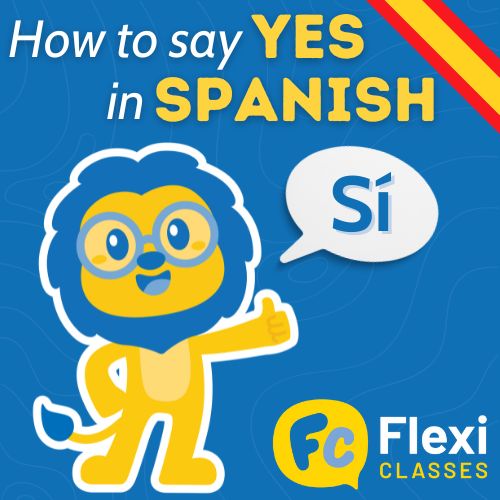
⁉️ Did you know?
Yes, is an adverb of affirmation, used to affirm or to agree and normally in answer to a question, affirmatively answering to what has been asked or proposed.
In Spanish, that equivalent affirmative adverb is sí.
When saying yes in Spanish, sí is your go-to multipurpose and all-around reply, apt for any occasion and context, whether formal or informal. When in doubt, di que sí (say yes).
Let’s rephrase that, when in doubt, use the Spanish adverb of affirmation sí.
🌟 A prior note
When the word sí is used as an adverb of affirmation (the English yes), remember to always place an accent over the i, like so, sí, to differentiate it from other contexts of use of the word.
✨ Let’s break down ‘Yes in Spanish’ with us!✨
Yes in Spanish || It’s a Yes, Formally
Yes in Spanish || It’s a Casual Yes
Yes in Spanish || Quiz
Yes in Spanish || FAQs
Yes in Spanish || It’s a Yes, Formally
But surely there are other forms of saying yes in Spanish, such as in English? Why certainly.
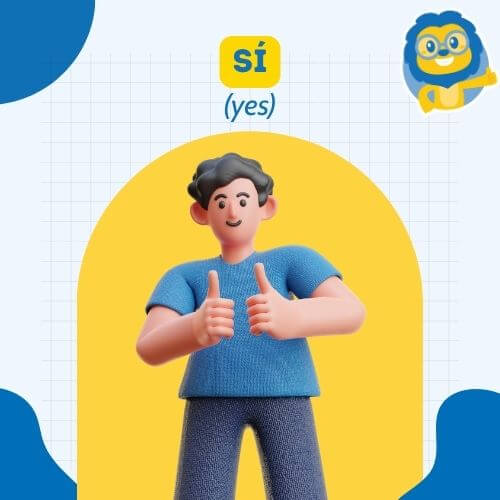
There are indeed other forms of giving a positive response. Note that in the prior two sentences, five affirmative terms were peppered in. Can you spot them?
👉 Let’s start with the more formal approach to giving positive responses in Spanish.
Say you are in a business meeting or are having a conversation at work with your boss or any other formal occasion for that matter, here are some terms equivalent to yes in Spanish, apt for more formal settings:
Por supuesto or sí, por supuesto (equivalent to ‘of course’, ‘by all means’ or ‘yes, of course’), like in the example below:
¿Podrías llamar al cliente de ayer?
(Could you call yesterday’s client?)Por supuesto, ahora mismo.
(Of course, right away.)Conforme (equivalent to saying ‘agreed’), see example of use below:
Conforme, aceptamos el precio de compra.
(Agreed, we accept the purchase price.)De acuerdo (equivalent to ‘agreed’ or to a formal ‘ok’)
De acuerdo, fijamos la reunion para la semana que viene.
(Ok, let’s set the meeting for next week.)| spanish | english |
|---|---|
| Conforme | Agreed |
| Conforme, aceptamos el precio de compra. | Agreed, we accept the purchase price. |
| De acuerdo | Agreed / Ok |
| De acuerdo, fijamos la reunión para la semana que viene. | Ok, let’s set the meeting for next week. |
Cómo no or sí, cómo no (equivalent to ‘why not’ or ‘of course’), is a very polite way of saying yes in Spanish, like in the example below:
¿Podrías ayudarme por favor a llevar estos libros?
(Could you please help me carry these books?)Sí, cómo no, encantado de ayudarte.
(Yes, of course, happy to help you.)There are as well other more indirect ways of saying yes in Spanish by giving a backhanded positive response and appropriate for formal contexts, like these:
Entendido (understood), see an example of use:
Entendido, hay que dejarlo todo ordenado después.
(Understood, everything has to be left neat after.)Tienes razón or for the formal you (singular) tiene razón (both translate to you are right), see the example below:
No lo teníamos que haber hecho, tienes razón.
(We shouldn’t have done that, you’re right.)Should you wish to stress something affirmatively and also appropriate in formal contexts, you can use these:
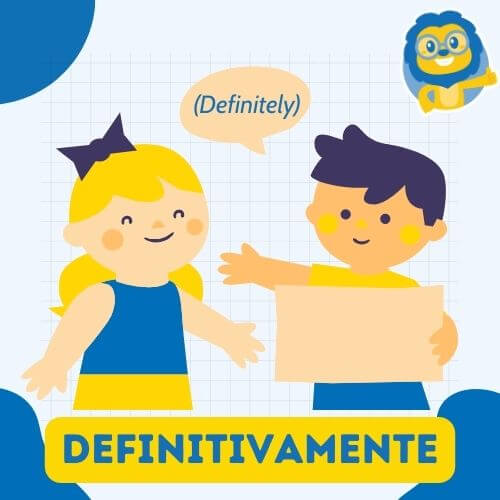
| spanish | english |
|---|---|
| Evidentemente | Evidently / Obviously |
| Llueve, evidentemente no podemos salir. | It’s raining, we obviously cannot go outside. |
| Claramente | Clearly |
| Claramente, las cosas tienen que cambiar. | Clearly, things have to change. |
| Definitivamente | Definitely |
| Definitivamente, el comprador está interesado. | Definitely, the buyer is interested. |
Yes in Spanish || It’s a Casual Yes
While all of the above forms of affirmation are apt for more formal contexts and are just as valid for use in informal situations, the reverse does not usually apply.
Meaning, the more informal ways of saying yes in Spanish are usually not appropriate in more somber or formal occasions.
👉 So if you want to keep it casual, light and breezy when saying yes in Spanish, here are some of the most commonly used yes phrases in Spanish, alternatively to sí:
Vale , this one is equivalent to anything from ‘ok’, ‘sure’, ‘yup’, ‘got it’ or a plain and simple ‘yes’, among others. In Spain, you will hear it being used over and over and over. This ‘yes’ phrase can be thrown in almost anywhere.
Here are some examples of use:
| spanish | english |
|---|---|
| Vale, nos vemos luego. | Ok, see you later. |
| Vale, vale, te he oído. | Yes, yes, I heard you. |
| ¿Vale? | Ok? |
| Eso no vale. | That’s not ok / That’s not fair. |
| Vale, ahora te sigo. | Ok, now I follow you. |
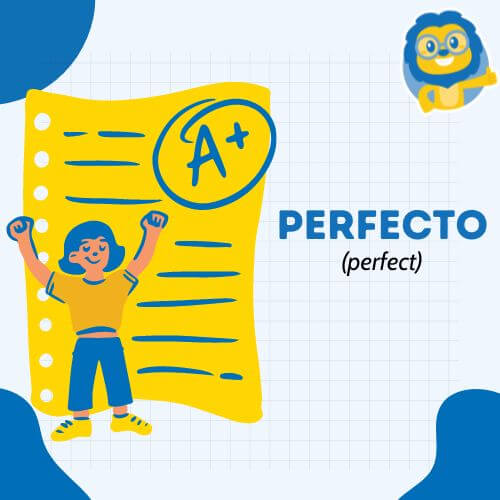
Perfecto (perfect). It’s a more sound yes, it’s a ‘yes, this is perfect’ kind of affirmation, like in the example below:
¡Perfecto, comemos juntos mañana!
(Perfect, we lunch together tomorrow!)Me parece bien (equivalent to saying ‘fine with me’ or ‘fine by me’), see an example of use:
Me parece bien, compartimos gastos a medias.
(Fine with me, let’s split expenses equally.)Claro or claro que sí (‘of course’ or ‘yes, of course’), like in the examples of use below:
| spanish | english |
|---|---|
| Claro que sí, cuenta conmigo. | Yes, of course, count on me. |
| Claro, me parece lógico. | Of course, it seems logical to me. |
Hecho (done), like in the examples below:
| spanish | english |
|---|---|
| ¡Yo traigo el postre, eso está hecho! | I’ll bring the dessert, that’s done! |
| ¡Trato hecho! | Done deal! |
Desde luego (equivalent to ‘of course’ or ‘indeed’), like in the examples below:
| spanish | english |
|---|---|
| Me gusta esta idea, desde luego. | Indeed, I like this idea. |
| Desde luego que vamos al cine este viernes. | Of course we are going to the movies this Friday. |
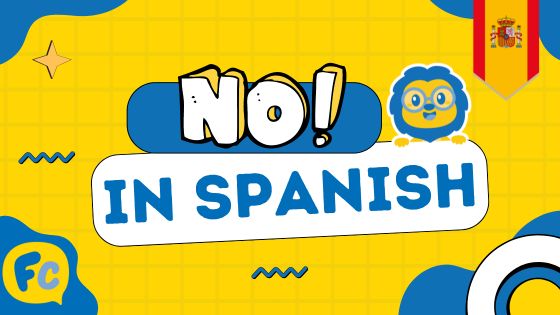
Saying No in Spanish – When No Doesn’t Necessarily Mean No
No in Spanish Formal Expressions, Slang and Indirect Refusals A straightforward ‘no’ in Spanish is said the same way and just as directly as it is in English, no. ❌ However, a negative response in Spanish is often adorned and…
Por supuesto (equivalent to ‘of course’ or ‘by all means’), can easily be used as well on a more casual basis, like in the examples below:
| SPanish | english |
|---|---|
| Por supuesto que funciona el ascensor. | Of course the elevator is working. |
| Por supuesto, coge lo que necesites de la nevera. | By all means, get whatever you need from the fridge. |
| ¿Por qué no? | Why not? |
| Vale, por qué no, cambiamos de planes. | Sure, why not, let’s change plans. |
Venga (in the context of an affirmation, it is equivalent to agreeing to something enthusiastically or at times can act like an affirmative nudge.
In the examples below notice that the use of venga can vary depending on the context of use:
| spanish | english |
|---|---|
| Venga, vamos a mejorar los resultados. | Come on, let’s improve the results. |
| Venga, levántate. | Come on, get up. |
| Venga, así lo haremos. | Agreed, let’s do it that way. |
Que sí (equivalent to a stronger and more affirmative ‘yes’), see the example below:
| spanish | english |
|---|---|
| Que sí, ya te he dicho que iré a la fiesta. | Yes, I already told you that I will go to the party. |
| Que sí, que sí, resérvame esos asientos. | Yes, yes, reserve me those seats. |
Sip (akin to saying ‘yup’, so know that it’s a very casual affirmative yes in Spanish, like in the example below:
Sip, voy al gimnasio.
(Yup, am going to the gym.)Ideal (similar to saying ‘perfect’, it’s an enthusiastic yes, that you will hear often when in Madrid), see the example below:
Ideal, quedamos a la tarde.
(Perfect, let’s meet in the afternoon.)Yes in Spanish || Quiz
Now you’ve mastered Yes in Spanish, why not check out these other Spanish essentials?
👉 How to say ‘I love you’ in Spanish
Or if you want a more multi-lingual challenge, learn how to say Yes in Japanese and Yes in Korean!
Yes in Spanish || FAQs
Does si have an accent in Spanish?
In Spanish, when the word si is used as an adverb of affirmation (the English word for ‘yes’), then yes, it carries an accent, like so:
Sí, quiero comer. (Yes, I want to eat.)
Sí, tienes razón. (Yes, you’re right).
Is sí in Spanish formal or informal?
When saying yes in Spanish, sí (‘yes’ in English) is an all-around reply, good for any occasion and context, whether formal or informal.
When doubting how to respond yes in Spanish, feel free to use the versatile Spanish adverb of affirmation sí.
Is sí in Spanish ‘if’ or ‘yes’?
In Spanish, if the word si has different grammatical uses:
When si is used as an adverb of affirmation (‘yes’ in English), to signify that meaning, it carries an accent, like so: Sí, quiero un café. (Yes, I want a coffee.)
Si can also be used as a personal pronoun, in which case, also carries an accent (lo quiere para sí – ‘he/she wants it for himself/herself’).
If the word si however is used as a conjunction (‘if’ in English), then it does not carry an accent.
Lastly, the word si can also be used to refer to the musical note si (as in the English note know as B), in which case, does not carry an accent either.
What is the casual way of saying yes in Spanish?
There are many ways of keeping it casual when saying yes in Spanish. Here are some of the most commonly used ones in Spain:
Vale (similar to ‘ok’), sip (equivalent to ‘yup’), perfecto (perfect), venga (akin to ‘come on’ or an enthusiastic ‘agreed’ or ‘ok’), claro (sure/of course), por supuesto (of course), hecho (done), ideal (ideal/perfect).
How do you say yes in Spanish formally?
If in a formal context or on more somber occasions, then resort to these more formal and at times even more polite ways of giving an affirmative response in Spanish:
Por supuesto or sí, por supuesto (equivalent to ‘of course’, ‘by all means’ or ‘yes, of course’),
Conforme (equivalent to saying agreed)
De acuerdo, (equivalent to agreed or to a formal ‘ok’)
Cómo no or sí, cómo no(equivalent to ‘why not’ or ‘of course’)
Entendido (understood)
Want More From LTL?
FANCY LEARNING SPANISH? Check out our online Spanish courses here.
We offer a 7-day free trial to all online students where you can study Spanish 24/7. It doesn’t end there either.
We teach over 10 of the world’s most popular languages 😎
Come and be a part of our amazing community.










